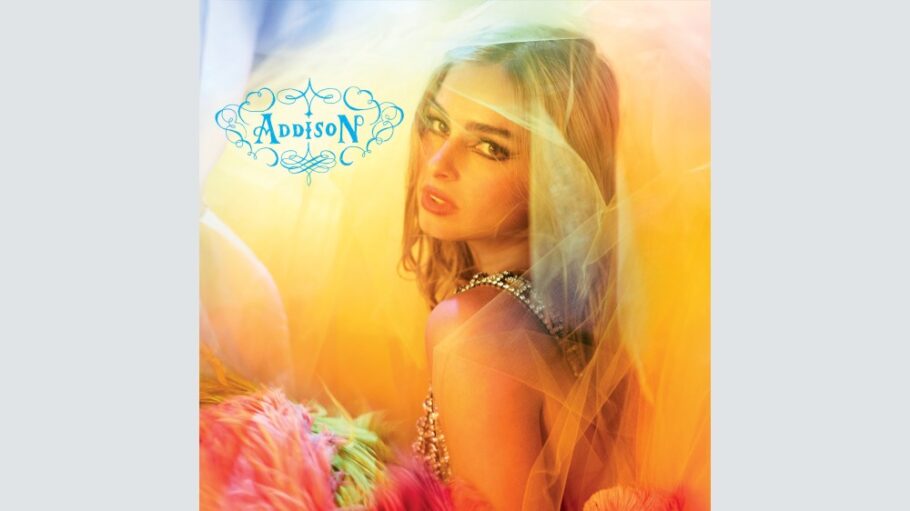Reinvention is an unusual concept to apply to someone at the beginning of their career. Transformation usually follows a clear introduction — a breakout role, a first book, a memorable performance. But in the case of Addison Rae, the idea of a “rebrand” defined her artistic breakthrough from the very beginning. Even as she earned credibility through co-signs and collaborations from shapeshifting tastemakers like Charli xcx and Arca, those endorsements only deepened the question: is this the product of a manufactured reinvention, or was this who she was all along?
To fully grasp the ethos of “Addison,” the 24-year-old TikTok sensation turned pop singer’s major label debut, you’d have to revisit the peaks and pitfalls of Addison Rae. As she became more of an influential figure on the viral dance and lip-syncing app, Rae worked to expand her presence in acting, music and business, even launching her own beauty line and starring in the Netflix film “He’s All That.” She released her debut single, “Obsessed,” produced by Benny Blanco, in 2021, though it was commercially unsuccessful.
Things were quiet for a while until a batch of Rae’s old demos began to gain traction online, with a niche group of alternative pop fans demanding an official release. Simply labeled “AR,” the four-song set arrived in 2023, and included what is now widely regarded as a standout single, “2 Die 4.” While some celebrated the simplicity of the song and its catchy verses — “My neck, 2 die 4 / My legs, 2 die 4 / This ah-ah sex, 2 die 4″ — others jumped to criticize her for it.
Over the last seven months, the singles for “Addison” arrived like clues, each more alluring than the last, filled with lush, sophisticated arrangements of glimmering, fuzzy pop melodies. “Diet Pepsi” and then “Aquamarine,” “High Fashion,” “Headphones On” and “Fame Is a Gun” all surpassed her previous work.
Rae flaunts an unadulterated freedom in her music that could easily be construed as juvenile or, well, weird. We got a clear taste of that in her feature on Charli’s “Von Dutch (Remix),” where at one point, she lets out a high-pitched scream that simmers. Though you could classify it as an unsettling disruption, the ad-lib became a trademark of the song. The same could be said here of the intro and outro of the trippy hip-hop breaks in “Money Is Everything,” which start somewhere sexy and slightly disorienting, and end in a state of ebullient bliss and borderline delusion.
In all of the promotion leading up to this release, Rae has made it a point that she and her collaborators approached the recording process without any direct influences in mind. Despite this, it’s hard not to draw comparisons to its most obvious touchstones, from Charli’s “Brat”-era tech house beats (see: “New York”) to Lana Del Rey’s melancholic refrains (“Summer Forever”) and the foundational aesthetics of Madonna and Britney Spears. But like most of her Gen-Z peers in pop, Rae is a student of the genre’s best and brightest; she wields relics of nostalgic imagery (at this point in time, that looks like wired headphones and a third generation iPod Nano) where they matter most, making references to her idols in a narrative that is still largely her own creation.
There is also no denying the lift of co-producers Luka Kloser and Elvira Anderfjärd — Rae’s only billed producers and co-writers on “Addison,” apart from Swedish songwriter Tove Burman, who has songwriting credits on “Lost and Found” and “High Fashion.” Kloser and Anderfjärd aren’t afraid to play with sound in unique ways, chopping spacey and rhythmic elements to complement Rae’s breathy vocals, like a carefully constructed puzzle.
Love Film & TV?
Get your daily dose of everything happening in music, film and TV in Australia and abroad.
After listening to the songs on “Addison” in their intended order, what becomes equally as intriguing are the lyrical themes, fueled by emotion and articulated in digestible one-liners and definitive affirmations: “I know the lows are what make the highs higher,” she sings in “Headphones On,” like something you’d underline in a wellness planner; “Life’s no fun through clear waters.” She finds comfort in her own systems of escapism, oftentimes leaving empowered by the moments she feels misunderstood or vulnerable.
Will this be enough to catapult Rae to the upper echelons of pop? Her determination alone demands consideration, even from those whose initial curiosities are fueled by skepticism. Either way, she’s managed to open the conversation — and that might be the most radical move of all.
From Variety US































